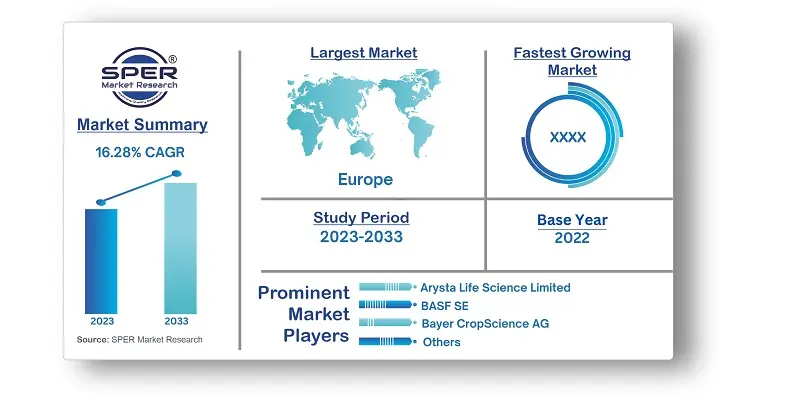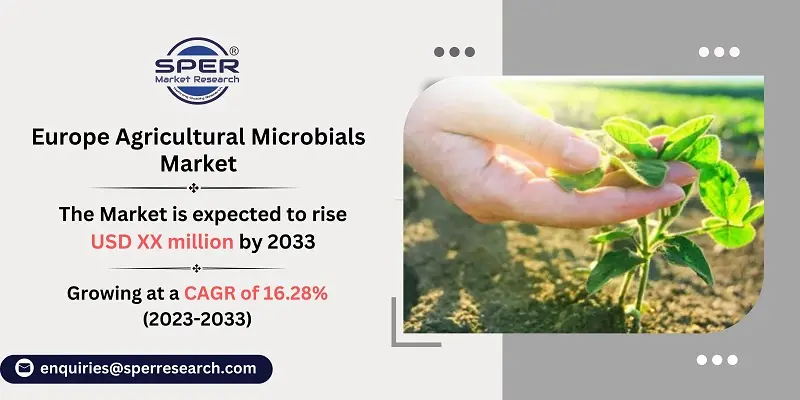
Europe Agricultural Microbials Market Growth, Size, Trends, Share, Revenue and Future Outlook
Europe Agricultural Microbials Market Size- By Type, By Application, By Mode of Application- Regional Outlook, Competitive Strategies and Segment Forecast to 2033
| Published: Feb-2024 | Report ID: AGRI2407 | Pages: 1 - 152 | Formats*: |
| Category : Agriculture | |||
- In January 2022, MeloCon LC was introduced by Certis Biologicals. Its active ingredient is Purpureocilium lilacinum strain 251, a water-dispersible concentration that contains spores from a naturally occurring soil fungus that eliminates a variety of harmful nematodes at every stage of their lifecycle.


| Report Metric | Details |
| Market size available for years | 2020-2033 |
| Base year considered | 2023 |
| Forecast period | 2024-2033 |
| Segments covered | By Type, By Application, By Mode of Application |
| Regions covered | Germany, Denmark, Italy, The United Kingdom, Rest of Europe |
| Companies Covered | Arysta Life Science Limited, BASF SE, Bayer CropScience AG, Certis USA LLC, Chr Hansen Holding A/S, Corteva Agriscience, Isagro USA, Koppert Biological Systems, Lallemand Inc., Marrone Bio Innovations, Syngenta AG, Verdesian Life Sciences LLC, and Others. |
- Farmers and Agricultural Producers
- Agricultural Input Suppliers
- Agrochemical Companies
- Agricultural Microbials Manufacturers
- Research and Development Institutions
- Government and Regulatory Authorities
- Sustainable Agriculture Advocates
| By Type: |
|
| By Application: |
|
| By Mode Application: |
|
- Europe Agricultural Microbials Market Size (FY’2024-FY’2033)
- Overview of Europe Agricultural Microbials Market
- Segmentation of Europe Agricultural Microbials Market By Type (Bacteria, Fungi, Virus, Others)
- Segmentation of Europe Agricultural Microbials Market By Application (Grains and Cereals, Pulses and Oilseeds, Commercial Crops, Fruits and Vegetables, Others)
- Segmentation of Europe Agricultural Microbials Market By Mode Application (Soil Treatment, Foliar Spray, Seed Treatment
- )
- Expansion Analysis of Europe Agricultural Microbials Market
- Problems and Obstacles in Europe Agricultural Microbials Market
- Competitive Landscape in the Europe Agricultural Microbials Market
- Impact of COVID-19 and Demonetization on Europe Agricultural Microbials Market
- Details on Current Investment in Europe Agricultural Microbials Market
- Competitive Analysis of Europe Agricultural Microbials Market
- Prominent Players in the Europe Agricultural Microbials Market
- SWOT Analysis of Europe Agricultural Microbials Market
- Europe Agricultural Microbials Market Future Outlook and Projections (FY’2024-FY’2033)
- Recommendations from Analyst
1.1. Scope of the report1.2. Market segment analysis
2.1. Research data source2.1.1. Secondary Data2.1.2. Primary Data2.1.3. SPER’s internal database2.1.4. Premium insight from KOL’s2.2. Market size estimation2.2.1. Top-down and Bottom-up approach2.3. Data triangulation
4.1. Driver, Restraint, Opportunity and Challenges analysis4.1.1. Drivers4.1.2. Restraints4.1.3. Opportunities4.1.4. Challenges4.2. COVID-19 Impacts of the Europe Agricultural Microbials Market
5.1. SWOT Analysis5.1.1. Strengths5.1.2. Weaknesses5.1.3. Opportunities5.1.4. Threats5.2. PESTEL Analysis5.2.1. Political Landscape5.2.2. Economic Landscape5.2.3. Social Landscape5.2.4. Technological Landscape5.2.5. Environmental Landscape5.2.6. Legal Landscape5.3. PORTER’s Five Forces5.3.1. Bargaining power of suppliers5.3.2. Bargaining power of buyers5.3.3. Threat of Substitute5.3.4. Threat of new entrant5.3.5. Competitive rivalry5.4. Heat Map Analysis
6.1. Europe Agricultural Microbials Market Manufacturing Base Distribution, Sales Area, Product Type6.2. Mergers & Acquisitions, Partnerships, Product Launch, and Collaboration in Europe Agricultural Microbials Market
7.1. Europe Agricultural Microbials Market Value Share and Forecast, By Type, 2024-20337.2. Bacteria7.3. Fungi7.4. Virus7.5. Others
8.1. Europe Agricultural Microbials Market Value Share and Forecast, By Application, 2024-20338.2. Grains and Cereals8.3. Pulses and Oilseeds8.4. Commercial Crops8.5. Fruits and Vegetables8.6. Others
9.1. Europe Agricultural Microbials Market Value Share and Forecast, By Mode Application, 2024-20339.2. Soil Treatment9.3. Foliar Spray9.4. Seed Treatment
10.1. Europe Agricultural Microbials Market Size and Market Share
11.1. Europe Agricultural Microbials Market Size and Market Share By Type (2020-2026)11.2. Europe Agricultural Microbials Market Size and Market Share By Type (2027-2033)
12.1. Europe Agricultural Microbials Market Size and Market Share By Application (2020-2026)12.2. Europe Agricultural Microbials Market Size and Market Share By Application (2027-2033)
13.1. Europe Agricultural Microbials Market Size and Market Share By Mode Application (2020-2026)13.2. Europe Agricultural Microbials Market Size and Market Share By Mode Application (2027-2033)
14.1. Europe Agricultural Microbials Market Size and Market Share By Region (2020-2026)14.2. Europe Agricultural Microbials Market Size and Market Share By Region (2027-2033)14.3. Germany14.4. Denmark14.5. Italy14.6. The United Kingdom14.7. Rest of Europe
15.1. Arysta Life Science Limited15.1.1. Company details15.1.2. Financial outlook15.1.3. Product summary15.1.4. Recent developments15.2. BASF SE15.2.1. Company details15.2.2. Financial outlook15.2.3. Product summary15.2.4. Recent developments15.3. Bayer CropScience AG15.3.1. Company details15.3.2. Financial outlook15.3.3. Product summary15.3.4. Recent developments15.4. Certis USA LLC15.4.1. Company details15.4.2. Financial outlook15.4.3. Product summary15.4.4. Recent developments15.5. Chr Hansen Holding A/S15.5.1. Company details15.5.2. Financial outlook15.5.3. Product summary15.5.4. Recent developments15.6. Corteva Agriscience15.6.1. Company details15.6.2. Financial outlook15.6.3. Product summary15.6.4. Recent developments15.7. Isagro USA15.7.1. Company details15.7.2. Financial outlook15.7.3. Product summary15.7.4. Recent developments15.8. Koppert Biological Systems15.8.1. Company details15.8.2. Financial outlook15.8.3. Product summary15.8.4. Recent developments15.9. Lallemand Inc.15.9.1. Company details15.9.2. Financial outlook15.9.3. Product summary15.9.4. Recent developments15.10. Marrone Bio Innovations15.10.1. Company details15.10.2. Financial outlook15.10.3. Product summary15.10.4. Recent developments15.11. Syngenta AG15.11.1. Company details15.11.2. Financial outlook15.11.3. Product summary15.11.4. Recent developments15.12. Verdesian Life Sciences LLC15.12.1. Company details15.12.2. Financial outlook15.12.3. Product summary15.12.4. Recent developments15.13. Others
SPER Market Research’s methodology uses great emphasis on primary research to ensure that the market intelligence insights are up to date, reliable and accurate. Primary interviews are done with players involved in each phase of a supply chain to analyze the market forecasting. The secondary research method is used to help you fully understand how the future markets and the spending patterns look likes.
The report is based on in-depth qualitative and quantitative analysis of the Product Market. The quantitative analysis involves the application of various projection and sampling techniques. The qualitative analysis involves primary interviews, surveys, and vendor briefings. The data gathered as a result of these processes are validated through experts opinion. Our research methodology entails an ideal mixture of primary and secondary initiatives.



Frequently Asked Questions About This Report
PLACE AN ORDER
Year End Discount
Sample Report
Pre-Purchase Inquiry
NEED CUSTOMIZATION?
Request CustomizationCALL OR EMAIL US
100% Secure Payment






Related Reports
Our Global Clients
Our data-driven insights have influenced the strategy of 200+ reputed companies across the globe.




















